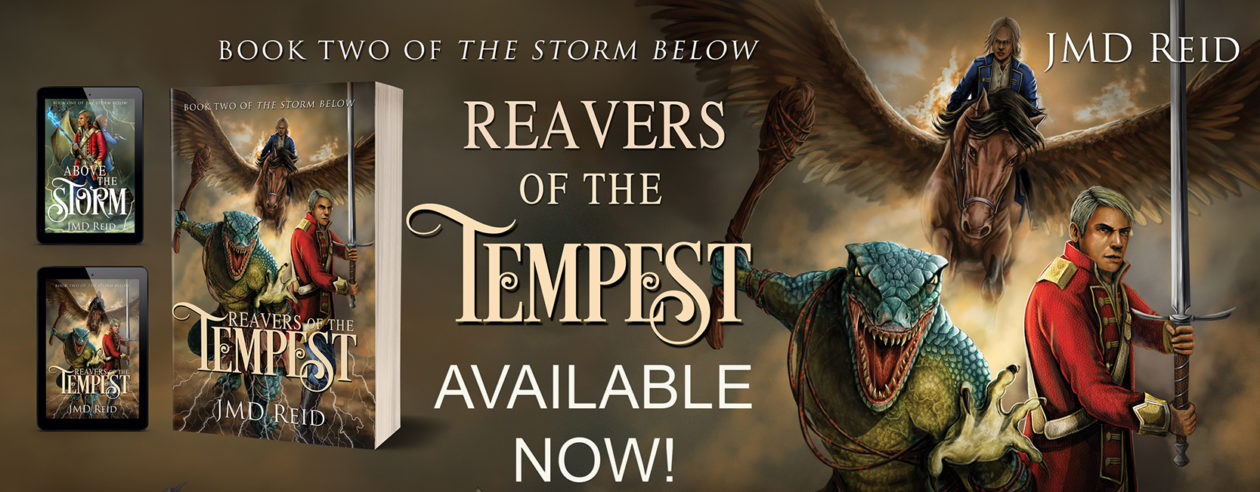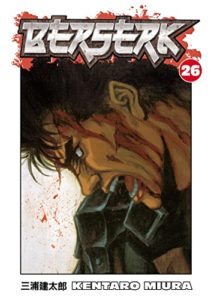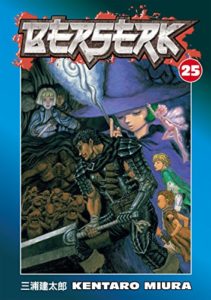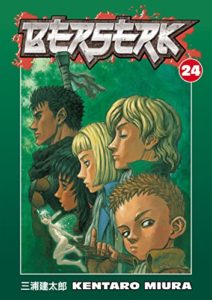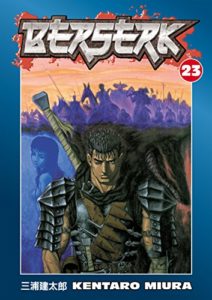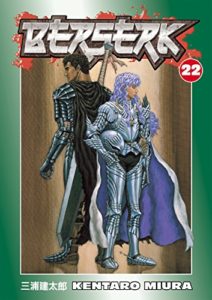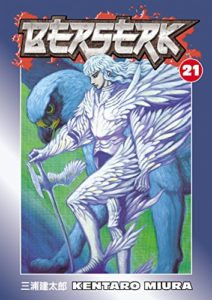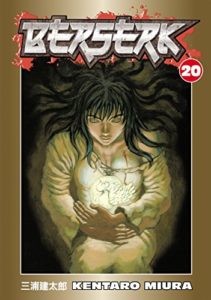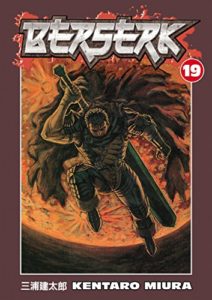Reread of Prince of Nothing Trilogy
Book 3: The Thousandfold Thought
by R. Scott Bakker
The Final March
Chapter 14
Shimeh
Welcome to Chapter Fourteen of my reread. Click here if you missed the Chapter Thirteen!
Some say I learned dread knowledge that night. But of this, as so many other matters, I cannot write for fear of summary execution.
—DRUSAS ACHAMIAN, THE COMPENDIUM OF THE FIRST HOLY WAR
Truth and hope are like travelers in contrary directions. They meet but once in any man’s life
—AINONI PROVERB
My Thoughts
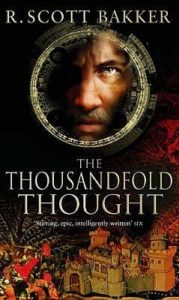 Wow, those are some quotes. The one is foreshadowing. Clearly, Achamian is going to learn something that he’s too terrified to write. Mind you, this is in his heretical book after he’s already rejected Kellhus and gone into voluntary exile. Even Achamian knows not to put what he learns. Even reading this the first time, you can only imagine the truth he learned.
Wow, those are some quotes. The one is foreshadowing. Clearly, Achamian is going to learn something that he’s too terrified to write. Mind you, this is in his heretical book after he’s already rejected Kellhus and gone into voluntary exile. Even Achamian knows not to put what he learns. Even reading this the first time, you can only imagine the truth he learned.
Which leads us to the Ainoni proverb that truth and hope are so rarely meet up that you get it once in a lifetime. It implies that hope is built on lies, on self-fabrication. That the truth doesn’t care about what sustains you. And when you learn that truth, it can kill that hope. However, once in a blue moon, they compliment each other.
Will it happen here?
Spring 4112 Year-of-the-Tusk, Shimeh
Esmenet dreamed that she was a prince, an angel fallen from the dark, that her heart had beaten, her loins had ached, for tens of thousands of years. She dreamed that Kellhus stood before her, an outrage to be blotted, an enigma to be dissected, and above all a burning question…
Who are the Dûnyain?
She awakes confused about who she is for a few moments. Then she doesn’t find Kellhus beside her, but she’s not surprised. She feels a “sense of finality in the air.” A dread has been building in her since reading The Sagas. She’s felt strange desires since her possession, seeing memories of the Inchoroi flooding her mind. Those desires, while alien in origin, still were hers. Kellhus tried to comfort her while questioning her, telling her what Achamian had already explained about Xinemus and his compulsion. Kellhus says that she was Aurang for a bit, which is why she felt like all those dark lusts were hers. He even says that is why Aurang tried to provoke Kellhus to kill her so she wouldn’t retain any of his secrets. But she argues that she felt them too strong. That they were her desires.
“Those desires weren’t yours, Esmi. They only seemed to be yours because you couldn’t see where they came from… You simply suffered them.”
“But then, how does any desire belong to me?”
She thought the dread building in her was knowing Xinemus was dying. She tried to convince herself after she learned of his death, but couldn’t. It was “too obvious for even her to believe.” Then Achamian moved out, giving her a new lie. But it, too, faded when she beheld Shimeh and believes they all will die here.
She dresses and learns Kellhus is wandering the camp without an escort. Once, Esmenet would have been fearful. No longer. She knows the Holy War is the safest place for him now. She heads out looking for him, moving through the nighttime camp, finding some still awake carousing or drinking. She bumps into an Ainoni and realizes he’s a former customer before she reunited with Achamian. She realizes from his smirk that he takes pride in having bedded the Prophet-Consort, revealing that Esmenet’s belief she had controlled her activities a lie. He grabs her arm, drunk, clearly looking to enjoy her again.
“Do you know who I am?” she said sharply.
“Yes,” he repeated, his manner lurid. “I know you…”
“Then you know how close you stand to death.”
A look of dank puzzlement. She advanced and struck him with an open palm.
“Insolent dog! Kneel!”
He stared, stunned, unmoving.
“Kneel! Or I’ll have you flayed alive… Do you understand?”
Terror breaks through his drunkenness. He blubbers for forgiveness. She contemplates having her agents find the man. Different ways he could be punished flash through her. She knows it’s petty, but she revels in them. She normally hated “the brutality that her new station had forced upon her.” She isn’t sure why she feels this way if it was his shame or his delight. “Or was it the mere fact that she could do these things?” She feels giddy knowing she’s Kellhus’s “vessel.”
She climbs the hills over the Meneanor Sea, thinking, and comes across Kellhus staring at Shimeh. He’s atop the ruins and contemplates joining him, but thinks it’s too risky considering she’s pregnant. Instead of seeming lonely, he dominates the situation as always. Without even glancing at her, he says she’s worried that he’s getting distant like he was before the Circumfix. She thinks he’s doing something dangerous, though she admits she’s trying not to. She asks why he’s here. He says he has to leave soon then offers her a hand.
With ease, he hauls her up to join him on the narrow ruin. She is dizzied by it and holds him, savoring his presence “as she always did.” She asks where is going. He answers Kyudea, which was the twin city to Shimeh, destroyed a long time ago. She mutters, “Your father’s house.”
“Truth has its seasons, Esmi. Everything will be made clear in due course.”
“But, Kellhus…” What did it mean that they had to assail Shimeh without him?
“Proyas knows what must be done,” he said decisively. “The Scarlet Spire will act as they see fit.”
Desperation welled through her. You can’t leave us.
“I must, Esmi. I answer to a different voice.”
She realizes it’s not her voice. “The things that moved her simply didn’t touch him.” She feels that they are moving through the heavens. He feels like a stranger to her. “The son of something terrible.” She asks if Akka should go with him as protection. Kellhus says he has to go alone and that he’s beyond needing Achamian for defense. Esmenet points out Achamian will want to know where he goes and Kellhus smiles and nods in that knowing way and says Achamian’s already asked. His levity makes her want to try, though she isn’t sure why. She finds herself kneeling before him, “playing out in pantomime what others did.”
No matter where they turned, men found themselves encircled by greater things. Usually, they ignored them. And sometimes, moved by pride and base hunger, they warred against them. But either way, those things remained just as great, and men, no matter how lunatic their conceit, remained just as small. Only by kneeling, by offering themselves as one might offer the haft of a weapon, could men recognize their place in this world. Only by submitting could they recognize themselves.
There was rapture in submission. The vulnerability of another towering overhead—precarious, like letting a stranger touch one’s face. The sense of profound communing, as though only those who acknowledged their insignificance could themselves be acknowledged. The relief of surrender, the disburdening that accompanied the yielding of responsibility.
The paradoxical sense of license.
Everything grew silent. She finds this moment euphoric and arousing. He laughs, helps her stand, and says he loves you. Though a part of her “gushed like an adolescent,” the old whore in her watches with “callused eyes.” She says she knows and he says she afraid, as all man are. She claims she can’t survive without him.
Hadn’t she told Akka the same thing?
He touches her pregnant belly and says he can’t without her. Then he kisses her. She holds onto him, not wanting to let go of him even as he looks away from her to Shimeh. She’s desperate and he knows.
“Fear for the future, Esmi, not me.” Fingers combed through her hair, drew tingling lines across her scalp. “This flesh is but my shadow.”
Kellhus reflects on how far he had come from Ishuäl and thinks he hears someone shouting his name. “How far had he come?” He had departed for Kyudea after sending Esmenet back to camp. He walks through hills and starts talking to the world, saying he knows the world can hear him. Wind answers him. He asks what he was supposed to do when they only attend “to what lies before their eyes.” If it doesn’t make them happy, they hurt it. They entrust “things unseen” to the world. The wind dies.
“What was I to do? Tell them the truth?”
He stooped, pulled a twig from the straps of his right sandal. He studied it by the moonlight, followed the thin, muscular branchings that seized so much emptiness from the sky. Tusk sprouting from tusk. Though the trees about him had died seasons previously, the twig possessed two leaves, one waxy green, the other brown…
“No,” he said. “I cannot.”
The Dûnyain had sent him into the world as an assassin. His father had imperiled their isolation, had threatened Ishuäl, the great sanctuary of their hallowed meditations. They had no choice but to send Kellhus, even knowing that they served Moënghus’s ends… What else could they do?
He reflects how he had mastered the three great weapons: faith, war, and sorcery. “He was Dûnyain, one of the Condition.” He followed the Shortest Path and yet “he had come so far.” He remembers weeping against Serwë’s corpse on the Circumfix. Thinking that, he takes off running across the broken ground.
He ran. Not once did he stumble, nor did he slow to determine his bearings. His ground was his… Conditioned.
Everywhere, all about him, one world. The crossings were infinite, but they were not equal.
They were not equal.
In the night, Kianene and Amoti hear a sound “like tapestries being beaten” moving across the sky. A shadow crosses the First Temple. Something inhuman watches. “It drank with its eyes, while its soul dreamed a million years.” It hates where it is, feeling like it is being cut.
Thorns. Its every glimpse speared like thorns.
The stone is weak. We could wash it away…
Do nothing, the Voice replied. Just watch.
They know we are here. If we do not move, they will fund us.
Then test them.
The creature is a Ciphrang named Zioz. It comes across a Cishaurim and attacks it, ripping the soul from the manling’s body and throwing the corpse to the ground. It thinks they are weak, but the voice says there are others. The Ciphrang speculates it might die, but the voice says Zioz is too strong.
Perhaps you will die with me… Iyokus.
Achamian feels “a pendulous absence” circling him and thinks he should wake up. He is dreaming he is Seswatha vomiting in the bowels of Golgotterath while Nau-Cayûti watches. The pair is still moving through the “endless dark” as they climb through new horrors.
Seswatha had heard rumors of the horrors of this place, speaking with Nil’giccas and hearing his account of fighting through the “horrid immensity of the Incû-Holoinas.” The Nonmen said 1 in a 100 Inchoroi died in the Ark’s crash, but they still had thousands left. Nil’giccas had warned the Ark “was an ingrown world.” A maze. You always have to be on guard in it.
Nau-Cayûti spots a light. They douse theirs and creep towards it across eons of detritus and filth. There is a swelling clamor. The passage leads to a mighty void, a great space. They are looking down upon a city in the bowels of the ship. “The steaming heart of Golgotterath.”
He [Achamian] should be awake.
He keeps dreaming of Seswatha staring at what he realizes is the hold of a vast ship where the city has been built in it. “Structures of mortise and hacked stones climbed their foundations, crusting their sides like stacked hornets’ nests, not dwellings but open cells, squalid and innumerable.” In it, they see human captives toiling amid Bashrag and Sranc while others. There are “open-air harems” where men, women, and children are used. Achamian again thinks he should be awake.
Screams and roars echo as Nau-Cayûti slumps in horror realizing that the woman he’s here for is down there. He attacks Seswatha demanding to know where she is. Achamian struggles awake at his point, realizing that his wards are trying to wake him up. He claws to consciousness and finds a Chorae dangling over his head.
“Some time ago,” the Scylvendi grated, “during all the empty hours thinking, I understood that you die as I do…” A tremor passed through the hand holding the string.
“Without Gods.”
Eleäzaras is watching the Ctesarat Tabernacle, the heart of the Cishaurim power, from his tent, Iyokus beside him. There are circles of blood painted around them. Tomorrow, he thinks, they will face their “mortal enemy.” Eleäzaras can’t hold back anything. He is employing demons. Iyokus retorts that the Cishaurim flee the Ciphrang. They have no Chorae up there but are summoning those who bear them to deal with the Ciphrang.
That was what Eleäzaras wants, for the “Snakeheads” to pull away some of the Chorae guarding the wall to defend them from Ciphrang, giving the Scarlet Spires a better chance in the assault tomorrow.
However, he disagrees with using such a powerful demon, a Potent, when a Debile would have worked. He thinks Zioz is becoming too strong. Iyokus is dismissive, saying all is well. Eleäzaras wonders how he’d become so cowardly and accuses Iyokus of recklessness.
Iyokus turned to him. Blood soiled his bandages where they pressed against his translucent cheeks.
“They must fear us,” the man said. “Now they do.”
Achamian is both terrified by waking up to Cnaiür and the Chorae and shocked, thinking he must still dream. Cnaiür demands to know where Kellhus is. Achamian begins to say he doesn’t know, but Cnaiür says he lies, that Achamian is his protector.
“Please…” he gasped, tried to cough without raising his chest. The Chorae had become unbearable. It seemed his heart might crack his sternum, leap into its absence. He could feel the stinging of his skin about his right nipple, the beginnings of the Salt. He thought of Carythusal, of Geshruuni, now long dead, holding a Trinket above his hand in the Holy Leper. Strange how this one seemed to have a different… taste.
I was never meant to escape.
Achamian feels Cnaiür’s murderous rage. The Scylvendi warns he won’t give Achamian another chance. Achamian tries not to panic as he manages to tell Cnaiür that he won’t betray Kellhus. Achamian says he’s willing to die.
Cnaiür thinks then offers a trade. Achamian is shocked by this as Cnaiür puts away the Chorae “like a child with a well-practiced toy.” Relief floods him but he’s still confused and frightened. Achamian asks what they will trade and notes there are a man and woman in the shadows behind Cnaiür.
“Truth.”
This word, intoned as it was with exhaustion and a profound, barbaric candour, struck him like a blow. Achamian pressed himself onto his elbows, glared at the man, his eyes wild with outrage and confusion.
“And what if I’ve had my fill of Truth?”
“The truth of him,” The Scylvendi said.
Achamian says he knows the truth, but Cnaiür cuts him off, spitting out he knows nothing. Like the rest of the salves. Achamian protests his freedom, but Cnaiür says he is because “all men are slaves.” Cnaiür says Kellhus is Dûnyain with such hatred in the word. It’s a curse, the way Achamian thinks of the Consult. Achamian has never heard the word but knows it means Truth in a dead tongue.
“The tongue is not dead,” Cnaiür snapped, “and the word no longer means ‘truth.’”
Achamian remembers the first time met Cnaiür, Serwë, and Kellhus, and realizes that they lied. Cnaiür didn’t come on a wager. Achamian has to know if Kellhus also lied about dreaming of the Holy War. Cnaiür wants to know where he is, but Achamian insists on the Truth not willing to “barter untested wares.”
The barbarian snorted, but it didn’t strike Achamian as an expression of derision or contempt. There was a pensiveness to the man, a vulnerability of movement and manner that contradicted the violence of his aspect. Somehow Achamian knew that Cnaiür wanted to speak of these things, as though they burdened him in the way of crimes or powerful grievances. And this realization terrified him [Achamian] more thoroughly than any Trinket ever could.
Cnaiür explains that Kellhus wasn’t sent, but summoned, that he’s not unique, and nor is he a savior. He’s a slaver. The blood drains from Achamian’s face. He doesn’t understand, but Cnaiür continues on explaining how the Dûnyain have bred themselves for millennia until humans were “little more than children to them.” Achamian listens as Cnaiür explains it all. Achamian finds it too “naked not to be true.” He listens to Cnaiür talk about his experience with Moënghus, how Cnaiür helped to murder his own father while claiming he wasn’t willing.
“They see our thoughts through our faces—our hurts, our hopes, our rage, and our passion! Where we guess, they know, the way herdsmen can read the afternoon’s weather in the morning sky… And what men know, they dominate.”
Cnaiür continues his story how he helped Moënghus kill his father. To Achamian, only Cnaiür and the Chorae exist. Cnaiür explains how Kellhus’s “every heartbeat” wars against the world. He conquers and makes men into his dog.
“They make us love! They make us love!”
Kellhus runs through the wilderness. Jackals start running beside him. He outruns them and he seems to hear them ask who he is. He calls them their master as he runs off into the night. He begins laughing, though the humor was foreign to him. He finds saying “your master” amusing.
Achamian is shocked by Cnaiür’s words after the barbarian leaves. He is bewildered by what he is learning. Off-balanced, he struggles to think. He knows that Cnaiür plans to kill Kellhus, Achamian’s “final, greatest student.” Despite that, he has betrayed Kellhus even after seeing that one of the figures with Cnaiür is “dead” Serwë. A skin-spy.
You gave him up. The Warrior-Prophet… You told the barbarian where he goes!
Because he lies! He steals what is ours! What is mine!
But the world! The world!
Fie on the world! Let it burn!
“The beginning!” he cried. Please.
Achamian pulls out a fresh paper and redraws his map of events, the one he lost to the Scarlet Spire. He stares at Inrau’s name after writing it, feeling grief. Then he writes “THE CONSULT” in violent strokes. He gave up Kellhus to the Consult.
When he finished, it seemed he held the very same parchment he had lost, and he pondered the identity of things, the way words did not discriminate between repetitions. They were immortal, and yet they cared.
He crosses out THE EMPEROR and replaces it with CONPHAS. Achamian knows he has to warn the Holy War of the threat marching from the West. He adds new lines to the map, things he’s learned since escaping the Scarlet Spire. In a steady hand, he adds DÛNYAIN and connects it to KELLHUS. Then, as if spurred, he writes Kellhus’s father, MOËNGHUS. “The man who summoned him [Kellhus] to the Three Seas…”
He dipped his quill into his inkhorn, his hand as light as an apparition. Then, as though crowded forward by dawning apprehension, he slowly wrote,
ESMENET
against the top left margin
How had her name become his prayer? Where did she fall in these monstrous events?
Where was his own name?
He studies his completed map, unaware of how long. The Holy War rouses around him. He feels like a ghost searching for a secret in the ink. All these important institutes representing the world. Representing prophets and lovers.
There was no pattern to these breathing things. There was no encompassing thought to give them meaning. Just men and their warring delusions… The world was a corpse.
Xinemus’s lesson.
He connects all the names to SHIMEH, the “bloodthirsty city.” He draws the line last to Esmenet’s name, knowing that she needed the city more than any other except, perhaps, Achamian. After drawing it, he keeps drawing it over and over until, in a frenzy, he rips through the vellum.
For he was sure that his quill had become a knife…
And that flesh lay beneath the tattooed skin.
My Thoughts
Aurang is compared to a fallen angel. The Inchoroi are rebelling against the Outside. They don’t want to follow the rules but want to their own thing. They think they’re right. Prideful.
Esmenet’s having the same issue as Xinemus. She felt those desires of Aurang as her own. Even though Kellhus explains it to her, she still feels that violent lust for rape.
How can you have a sense of identity after something like that? Where you became someone else and felt everything they do. Where their desires were your desires. What does it say about yourself? How can you trust anything after that?
After that, she’s having more illusions shattered from the knight she encounters about her own sexuality. She thought she was taking from men when she was selling her body, but to a man, spreading seed is a primal motivation. He takes pride in having done it to a woman so powerful. To protect her ego, she has to lash out, to prove that she’s not that woman any longer. That she’s risen above him. She has every right to be angry though she’s shocked by how quickly she came to ordering his death. How much the power has already changed her. We all have those dark impulses in us. Murder lurks in every human’s heart, but we usually control those impulses. We are ashamed of them, often pretending we don’t have them. She is in a position to exercise those impulses, and she knows it. It’ll be a test of her character going forward how she wields that ultimate power.
She calls Achamian “Akka” to Khellus. She’s starting to realize she doesn’t love Kellhus. The possession has eaten away at her worship. She’s realizing that her voice doesn’t move him. Her concerns are not his. That’s not good for a healthy relationship. Then he seems like a stranger to her, something dangerous, and she instantly asks about Akka.
She kneels in supplication before her husband and thinks she’s just imitating worship, that she’s his wife. But this is not something a wife does. Not in a real relationship. She’s prostrating herself before her prophet.
More doubt seeps into Esmenet. She’s seeing Kellhus like a whore now, too. She’s growing cautious around him even as he’s manipulating her to get that giddy, lovey-dovey response. Then the realization that she had told “Akka” the same things as Kellhus. That she meant these words for another.
She holds onto him with desperation because the lie is slipping from her that she loves him. She was only infatuated and never formed anything deeper. How can she when Kellhus’s emotions are as shallow as they come.
Kellhus is almost praying to the world. To the Darkness that Comes Before. He isn’t sure if he’s doing the right thing. He is having doubt, but he can’t see any other way. Just like the Dûnyain who sent him despite the fact they were doing what Moënghus wanted. “What else could they do?” Not even the Dûnyain, even Kellhus, are self-moving souls. They are still bound by cause.
Now we’ll see what effect all those causes have had on Kellhus. How they have changed him from the standard Dûnyain. How the Outside has affected him. He’s like Cnaiür. He’s been nudged from the Dûnyain tracks onto something else.
Kellhus remembers weeping. He’s feeling it. That he’s not wholly Dûnyain any longer. His mission has changed. He has come to a decision as he takes off running across that he know thinks as his. He knows longer is following the Conditioned path of his father, but one of his own choosing.
What a cool way to introduce demon summoning. From the point of view of the demon thrust into this world and constrained by reality. It hurts it and has to obey the voice. It knows who summoned it, and is eager to hurt the summoner. Rumor has it, the Ciphrang you summon get to play with you in the Outside.
Iyokus, it’s going to suck when you die.
Then we switch to the dream of the true horrors of Golgotterath, the slaves, the rape-pits. It’s disturbing. It is a place of true evil. A true Hell, the place the Inchoroi want to escape from experiencing they have unleashed on those they dominate. It is a place where reprehensible atrocities are committed in the name of satiating selfish desires. That is all the Inchoroi are. They don’t control themselves. If they can brutalize you, they will and enjoy it.
Achamian wakes up from one form of danger to another. To another man who doesn’t control his desires. Cnaiür seizes what he wants, kills men to get it, and brutalizes those when he needs to satiate his mad urges.
We get just a tease about Ciphrang. Two different classifications. Potent and Debile. I hadn’t heard of that word before, debile. It’s an archaic word for feeble, where our word debility originates from. Interesting to call one Potent and the other Feeble. Such a glimpse into this one bit of magic. I’ll have to pay attention to the end of The Unholy Consult when Ciphrang are next employed in the series.
“I was never meant to escape.” A curious thought for Achamian to have at this moment. To escape the Scarlet Spire? Probably. Kellhus never expected to see him, moving into the seduction of Esmenet from him, causing all sorts of problems when Achamian returned. I am convinced Kellhus would have tried to convince the pair that it was only right for Esmenet to be Kellhus’s queen, instead it gave Achamian that wedge of anger that ultimately led him to reject Kellhus and for Esmenet to never surrender her love for Achamian but only to bury it beneath her infatuation with Kellhus.
Or, perhaps, Achamian thinks he should have died that day in the tavern of Carythusal, when Geshruuni spared him. He can’t think that he will escape the fate of the Chorae a second time. Not with Cnaiür looming above him.
This meeting is great between Achamian and Cnaiür. The reversal. The bewilderment. The discussion of Truth and what Kellhus is. The Dûnyain spared Cnaiür out of pity when he witnessed the man’s madness on the beach. Kellhus, a good Dûnyain, should have killed him. But even then, he was splitting off from Conditioned Ground.
Of course, Cnaiür wants to speak. Who likes to swallow a secret. Especially one that causes such harm. Cnaiür, for all his hatred, has come to like Proyas as a friend. He hates what Kellhus is doing and, clearly, he has had his fill of it. He’s out for vengeance. He’s ready to unburden himself. It’s like his deathbed confession. Time to get his sins off his chest before he crosses the threshold.
“What men know, they dominate.” There is so much truth in that sentence. The crux of humans. We crave knowledge so we can make order out of chaos. We seek to dominate everything around us for stability. Familiarity. So then we can indulge in our desires. Our passions. We take nature and divide into plots. We take plants and cultivate them into crops. We’ve breed beasts into pets and livestock. We tamed the atom because we understood it.
Kellhus running with jackals right after we have Cnaiür compare humans as dogs eager to obey their Dûnyain master out of love. A loyal pack trained to obey.
For the first time since Inrau’s suicide, Achamian begins acting like a proper Mandate. He’s had his faith in Kellhus destroyed. He was manipulated by Kellhus all this time to not report in on him. So he put aside his map. He didn’t use it. Now he’s redrawing it, seeing the new state of the world.
He understands as he connects Esmenet’s name to Shimeh why she has fallen to Kellhus. The promise of salvation. That same promise, of being freed from the sin of sorcery, had enraptured Achamian, too. Remember back in book two when Kellhus scraped away the ink in the scripture that condemned harlots like Esmenet. How she wept. How she surrendered to him thinking it was love, but it was really worship.
Shimeh is the representation of the lie of Kellhus’s divinity. He has promised them salvation and then lead them to commit terrible acts. They are murdering their fellow men out of a delusion. They are slaves to Kellhus and the darkness that comes before him.
Esmenet is his slave. She’s Achamian’s prayer, and Kellhus stole her. Now that the truth is revealed, Achamian realizes just how utterly betrayed he was by Kellhus.
Click here to continue on to chapter fifteen!
Hi, if you like my Analysis, you can connect with me on Facebook and Twitter, and you can pre-order my first fantasy novel, Above the Storm, from Amazon or purchase my short story collection! Also, please leave any comments or criticisms below! They help keep me motivated!
 To save the world, Ary must die!
To save the world, Ary must die!
Ary, a young man scarred by his past, is thrust into the dangers of the military. But he carries a deadly secret: the dark goddess’s touch stains his soul.
Her taint threatens to destroy all he loves.
He must hide the truth from the other marines and the woman he loves. Can Ary survive the dangers of service and the zealous assassin plotting his death?
Are you ready for the action, danger, romance, and betrayal exploding across the skies Above the Storm!
